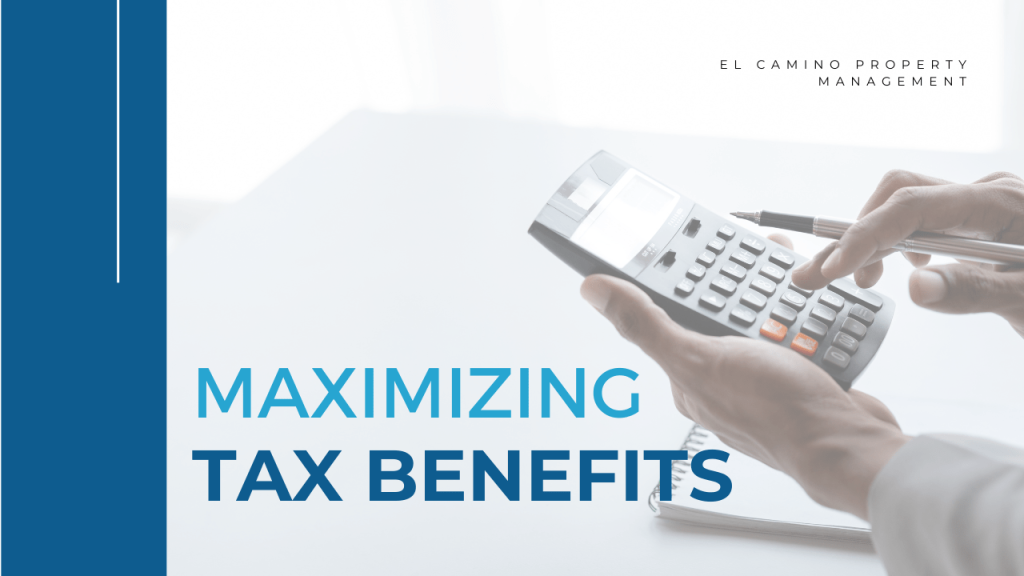
Taxes are a fun topic.
Well, not usually. But when we’re talking about the tax benefits that are available to rental property owners, there’s a little less anxiety around the idea of what you owe to the government. With the right tax strategies, you could find yourself reducing your tax burden and saving some money.
We’re expert property managers in Los Angeles County, not tax experts. But, we work with owners like you all the time to better position themselves for tax savings, and we have some strategies for savings that you will surely find useful.
Here’s what you need to know to maximize your tax benefits.
Depreciation as a Tax Benefit on Rental Homes in Los Angeles
Depreciation is an accounting method that allows property owners to deduct the cost of tangible assets over their useful life. For rental properties, the IRS considers these assets to have a useful life of 27.5 years for residential properties and 39 years for commercial properties. This means you can write off a portion of the property’s value each year, providing substantial tax savings. There are a number of benefits for investors who can leverage depreciation at tax time:
- Reduced Taxable Income
One of the primary benefits of depreciation is its ability to reduce your taxable income. By deducting the depreciation expense from your rental earnings, you effectively lower your overall taxable income, which can lead to a lower tax liability.
- Enhanced Cash Flow
With a lower tax bill, you retain more of your rental income, improving your cash flow. This added liquidity can be reinvested into property improvements, new acquisitions, or other investments, accelerating your portfolio growth.
- Offset Maintenance and Repair Costs
Depreciation can also complement the deductions you claim for maintenance and repair expenses. By combining these deductions, you can offset a significant portion of your operational costs, making property investment more financially efficient.
Calculating depreciation involves three main components. First, you have to know the property’s purchase price, including any associated costs such as legal fees and transfer taxes. Subtract the value of the land from the total cost basis, as land cannot be depreciated. Then, you’ll divide the adjusted cost basis by 27.5 (that’s the residential amount per the IRS) to determine your annual depreciation expense.
Make sure you’re aware of the recapture tax. When you eventually sell your property, the IRS imposes a recapture tax on the depreciation deductions you’ve claimed. It’s important to plan for this potential tax liability as part of your long-term investment strategy.
Deducting Operating Expenses
The IRS sees rental properties as businesses. Therefore, you’re able to take a lot of tax deductions that businesses can also take when they’re balancing gains and losses. When it comes to rental properties, several operational costs qualify as tax-deductible expenses, and you’ll want to make sure you’re taking these tax breaks when you do file your taxes.
- Mortgage Interest
Mortgage interest often represents one of the largest expenses for property owners. Fortunately, the interest paid on loans used to purchase or improve rental properties is deductible. Keep records of all interest payments made throughout the year to maximize this benefit.
For real estate investors, the mortgage interest deduction can serve as a powerful tool, helping to offset the cost of borrowing. Given the typically high amounts involved in real estate loans, the interest portion can be substantial, making this deduction an essential strategy for managing expenses. With the amount you likely have to borrow in order to invest in Los Angeles real estate, deducting the interest on your loan can make a huge difference in what you’re saving.
To qualify for the mortgage interest deduction, your property must be classified as a rental property by the IRS. You must rent it out for more than 14 days per year. You must also own the property and have a mortgage that’s specific to that rental property. And only the interest portion of your mortgage payment is deductible, not the principal.
- Property Taxes
Local property taxes can also be deducted, easing the financial burden on rental property owners. Ensure you keep accurate records of property tax payments to claim this deduction without issues.
Property taxes must be imposed by a state, local, or foreign government and should be based on the assessed value of your property. These taxes are typically charged annually and are commonly included in your mortgage payment. Rental property owners use the Schedule E form to report income and expenses related to rental properties. Enter the total property tax amount in the “Taxes” section of Schedule E. Ensure that you only deduct taxes for the period the property was used for rental purposes.
Remember, personal property taxes, such as those on vehicles, are not deductible as rental expenses.
- Insurance Premiums
Insurance is a vital component of property management, protecting you against potential risks such as fire, theft, or liability claims. Premiums paid for property insurance can be deducted from your taxable income, providing relief for something that your rental property absolutely needs. Those deductions include costs for:
- Property Insurance. Coverage for damage caused by events such as fires, storms, theft, and vandalism.
- Liability Insurance. Protection against legal claims arising from injuries or damages that occur on your property.
- Loss of Income Insurance. Also known as rental income protection insurance, this covers lost rental income if your property becomes uninhabitable due to a covered event.
It’s important to note that while your personal homeowner’s insurance is not deductible, the insurance specifically related to your rental property is.
- Maintenance and Repairs
Expenditures on regular maintenance and necessary repairs ensure your rental property remains in good condition. These costs are generally tax-deductible, ranging from routine landscaping to fixing plumbing issues. However, it’s important to distinguish between repairs and improvements.
To qualify for a tax deduction, the work done must be considered a repair or maintenance task rather than an improvement. Here’s the distinction: Repairs are tasks that restore the property to its original condition, such as fixing a leaky sink, patching a roof, or repainting a worn wall. Maintenance includes regular upkeep activities like lawn care, cleaning gutters, or servicing HVAC systems.
On the other hand, improvements, which add value or extend the life of the property (like adding a room or upgrading the kitchen), are not immediately deductible. Instead, these are capitalized and depreciated over time.
- Utilities
If you cover utility bills for your rental property, these expenses can be deducted as well. This includes water, gas, electricity, and trash collection fees.
- Professional Services
Hiring professionals, such as Los Angeles County property managers, accountants, or legal advisors, incurs fees that are tax-deductible. These services play a critical role in managing your property effectively, and deducting their costs can significantly reduce your taxable income. This tax deduction, for example, almost allows your property management services to pay for themselves.
Navigating the Complexities of Los Angeles Tax Laws
As a landlord in Los Angeles County, you’ll need to have a grasp on your responsibilities and your benefits when it comes to taxes. How well do you understand the various state and local taxes that apply to property ownership and rental income?
The landscape of Los Angeles tax laws is intricate, and staying informed is vital to ensure compliance and maximize your investment returns. Here are a few things to consider, even as you’re maximizing your tax benefits.
- Paying California State Income Tax
If you’re a landlord in Los Angeles County generating rental income, you’re subject to the California state income tax. The state imposes a progressive tax rate that varies based on your income bracket. Make sure to accurately report your rental income and any associated expenses to determine your taxable income.
- Local Property Tax
Property tax in California is governed by Proposition 13, which limits the annual increase in assessed value to a maximum of 2% as long as ownership does not change. New property owners should be aware that the assessed value will reset to the purchase price at the time of sale. It’s crucial to budget for property taxes as a significant ongoing expense.
- Los Angeles Business Tax
In Los Angeles, landlords who earn rental income must register and pay the Los Angeles Business Tax. The tax rate varies based on the amount of gross receipts generated from rental properties. Ensure you register with the City of Los Angeles Office of Finance and file your business tax return annually.
Accurate record-keeping is essential for maximizing your real estate tax benefits. Maintain comprehensive documentation of your property’s purchase price, improvement costs, and any other related expenses to ensure your depreciation calculations are correct.
 Navigating tax laws can be complex, especially as they pertain to real estate. Consulting with a tax professional who specializes in real estate can provide personalized guidance and ensure you’re fully leveraging all available deductions.
Navigating tax laws can be complex, especially as they pertain to real estate. Consulting with a tax professional who specializes in real estate can provide personalized guidance and ensure you’re fully leveraging all available deductions.
Let’s talk about your Los Angeles County rental property. Please contact us at El Camino Property Management.
Please note, this information is deemed reliable, but not guaranteed. Please consult appropriate professionals for specific situations.



